Wondering how much a tire rotation costs? You're in the right place.
The actual cost of a tire rotation depends on the type of vehicle,
wheel size, and the auto shop you go to. Generally speaking, the
average cost is between $35 and $50 for lightweight trucks and
run-of-the-mill cars.
Despite the price, regular tire rotations are essential for the
longevity of your car's tires and your overall safety.
In the following sections, we'll explore the cost of a tire rotation per
vehicle type, whether you should balance your tires too, and so much more.
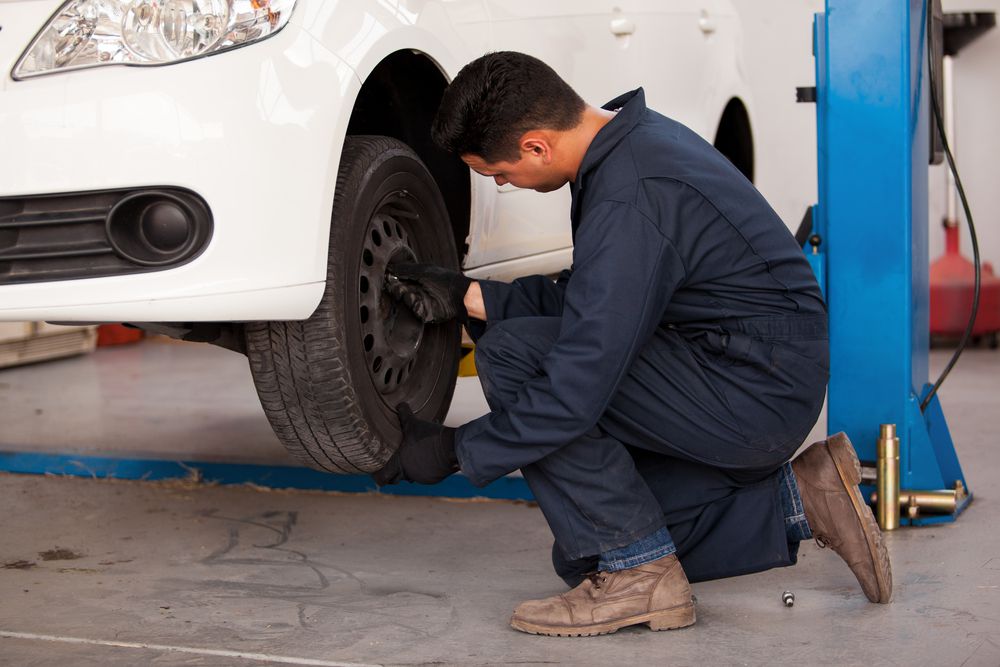 Mechanic rotating tires in a tire shop.
Mechanic rotating tires in a tire shop.
How Much Does It Cost To Rotate Tires?
Historically, mechanics conducting tire rotations would simply unbolt all
the lug nuts and rotate one back or forward.
At the end of the process, every tire had moved one place over.
Alternatively, professionals would just swap the rear tires with the front
tires.
But these days, modern vehicles come with various drive lines, so mechanics
have been forced to adapt their processes.
It's more complicated than ever due to the potential size difference
between the front and rear tires (seen on performance or luxury cars), the
type of vehicle, and the wheel sizes.
As for the average cost of a tire rotation, you can expect to pay between
$35 and $50 for light trucks and standard cars, making it one of the least
expensive (and quickest) services.
Naturally, you'll pay more for a tire rotation on a luxury car or heavier
vehicle — shockingly, it may total over $200!
Considering that you'll almost always need a full tire replacement within
half the mileage of a run-of-the-mill vehicle, it's certainly a costly
possession.
Add on other services like tire balancing and the price will increase.
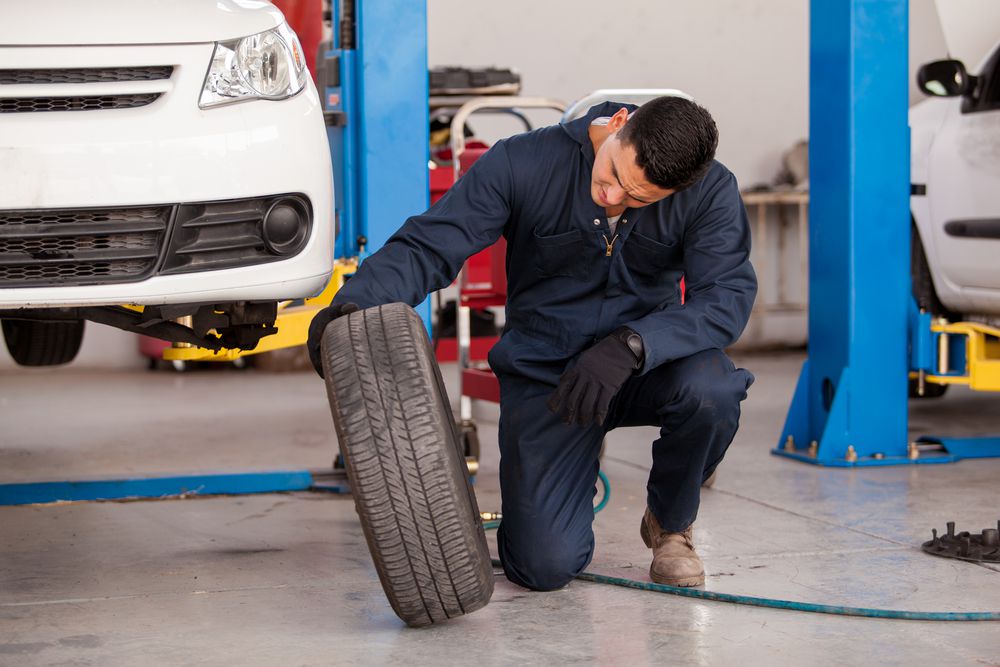 Mechanic inspecting a tire during tire rotation.
Mechanic inspecting a tire during tire rotation.
Front-Wheel-Drive (FWD) Tire Rotation Cost
Most cars on the road are front-wheel-drive.
In other words, the usually horizontally oriented engine sends power to the
front wheels, which also ensures steering.
Thus, the front tires wear out quicker than the back car tires.
Normally, the mechanics at the tire shop will simply rotate the four tires
in an "X" or criss-cross pattern — the rear passenger tire goes to the
front driver's side, and the back driver's side tire heads to the front
passenger side.
These tend to be the least expensive tire service at $40 to $70.
Rear-Wheel-Drive (RWD) Tire Rotation Cost
RWD vehicles used to be the standard.
However, it started to change around 1980 as manufacturers realized the
benefits of front-wheel-drive cars and trucks.
Despite the differences (i.e., the power goes to the rear wheels), the tire
rotation process is virtually the same.
A typical RWD tire rotation can cost anywhere from $30 to $80.
The slightly increased price is due to the larger wheel sizes of older
rear-wheel-drive vehicles.
All-Wheel-Drive (AWD) Cost of Tire Rotations
An AWD vehicle will likely wear its tires out much faster than others.
Therefore, it's even more important to get your tires rotated regularly,
thanks to the increased wear speed and the various power loads.
The majority of AWD vehicles disperse the most power to the front car
tires.
However, since the rear wheels also receive power, the tires wear out fast
here as well.
This makes tire rotations trickier, as uneven wear is expected, regardless
of how much you try to even it out.
You cannot rotate your tires on an all-wheel-drive vehicle in a circle or
front wheels to back wheels.
Instead, they must be rotated in an X shape (i.e., the standard procedure
for today's vehicles).
Provided there aren't too many unevenly worn tires, the tire rotation will
cost around the same as a regular FWD or RWD car.
But, these tires typically need balancing at every rotation, which can add
up to 50% to the total price.
A safe estimate is between $80 and $100 at standard auto shops.
Most tire manufacturers urge AWD owners to never skip more frequent tire
rotations because missing just one service can bring them past the point of
rotation and straight to replacement!
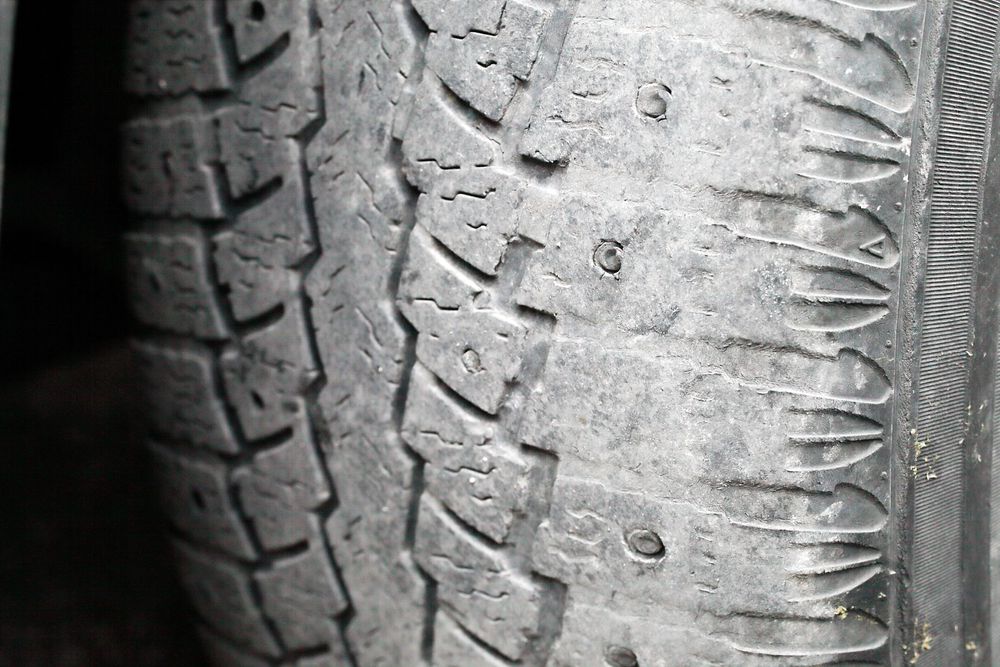 Regularly rotating your tires will help prevent uneven wear.
Regularly rotating your tires will help prevent uneven wear.
Four-Wheel-Drive (4WD or 4x4) Cost of Tire Rotations
Despite popular belief, AWD and 4WD systems aren't the same.
Generally speaking, 4x4s will cost less to service than all-wheel-drive
vehicles because they're designed for limited use, meaning the car uses the
rear wheels for power on tarmac unless you switch the 4WD mode on.
In fact, using a four-wheel-drive vehicle on dry pavement can damage the
whole system.
The most expensive tire rotations come from improper use of the 4WD system
over prolonged periods.
When properly inflated and correctly maintained, the tire rotation cost
will hardly ever exceed $100.
Electric Vehicle (EV) Tire Rotation Costs
While electric vehicles are relatively new, they've quickly earned a
reputation for burning rubber.
Therefore, you'll need to rotate tires more frequently.
EVs apply all their torque immediately, putting a huge strain on the tires.
Standard cars don't reach top performance until the tires are fully
underway, whereas electric vehicles are constantly at peak performance,
quickly progressing tire wear.
Rotate your tires every 3,000 miles to save money on replacements.
The tire rotation service will cost about $80 to $100.
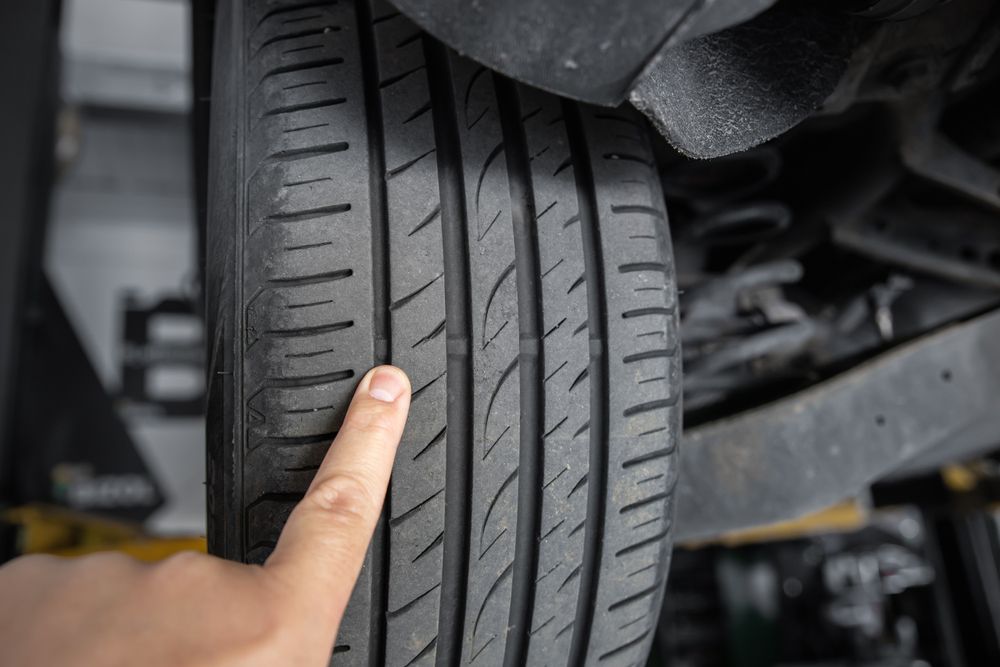 Regularly rotating your tires will increase their lifespan.
Regularly rotating your tires will increase their lifespan.
Is It Worth Getting Tires Rotated?
To maintain road safety, rotating tires regularly is absolutely worth it.
But if you're worried about the cost of tire rotations, here are some
things you can do to save money:
-
Consider rotating your tires by yourself. As long as you have a torque
wrench and jack stands, and understand the basics, it's the most
effective way of reducing costs and extending the lifespan of all four
wheels.
-
Reduce your mileage, drive smoothly, and perform proper maintenance.
Doing so will lengthen the time between each tire rotation.
-
If you're offered a tire rotation service for free in a professional
package, take it!
How Long Does It Take To Rotate All 4 Tires?
Most auto shops complete a tire rotation in 30 to 40 minutes, meaning it
takes around 7.5 to ten minutes per tire.
Although, some ultra-experienced mechanics can rotate tires in a mere 15
minutes!
It depends on the type of vehicle, the size of the wheels, and whether your
car requires other services at the same time.
How Often Should Car Tires Be Rotated?
Your driving habits, vehicle type, and the tires themselves dictate how
often you should rotate your tires.
That said, best practice states you should rotate them every 6,000 miles —
but every 5,000 to 7,000 miles is the general rule of thumb for ensuring
proper fuel efficiency.
If you often drive in dusty or dirty places with rough roads, you should
seek a tire rotation service more frequently.
Plus, winter tires need rotating every 4,000 miles.
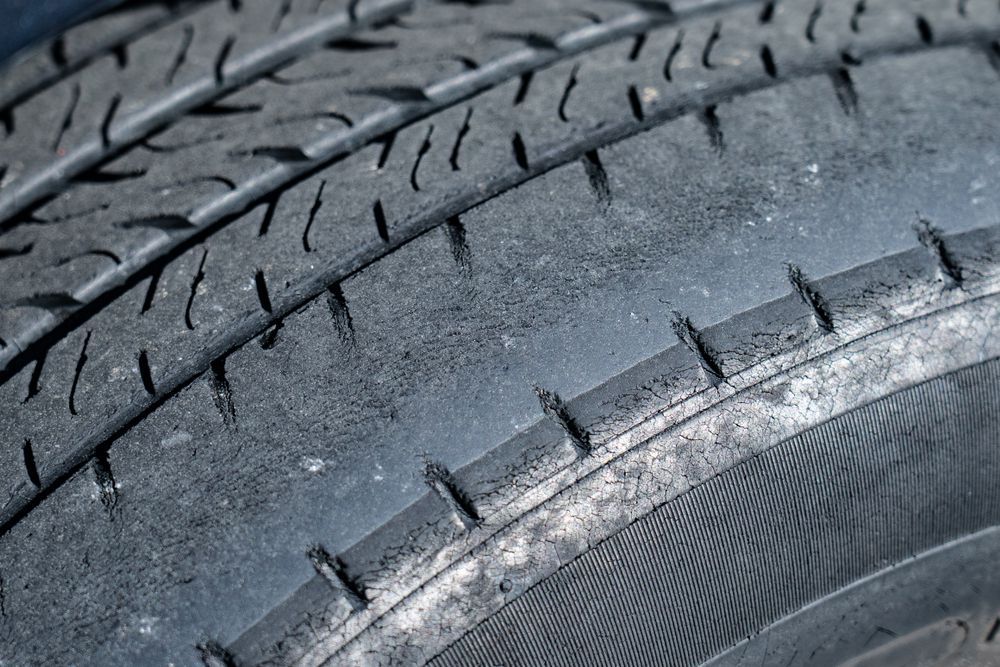 Uneven tire wear from not rotating your tires.
Uneven tire wear from not rotating your tires.
What Happens If You Never Rotate Your Tires?
Tire rotation helps your tires wear evenly so no one spot experiences more
wear than the rest.
Ultimately, it improves your car's handling and extends the tires'
lifespan, so it's worth keeping up with frequent tire rotations.
Uneven tire wear can create an unstable driving surface, decreasing your
road safety.
Hydroplaning, poor traction, heat buildup, and increased risks of blowouts
or punctures are all more likely if you fail to rotate your front and rear
tires.
But we'll let the statistic speak for themselves.
In a report published by the National Highway Traffic Safety
Administration, it's proven that
insufficient tread depth is responsible for over one-quarter of
tire-related vehicle accidents
.
Proper tire maintenance and rotations are important for keeping you, your
passengers, and other road users safe.
How Long Will Tires Last If Not Rotated?
If you don't rotate your tires, you can expect to lose roughly 20% of their
useful lifetime.
Neglecting tire rotations but still keeping an eye on your tire pressure
monitoring system means you'll likely lose around 17% or 10,000 miles of
usage.
But as long as your tires have adequate tread depth, they'll still be safe
to use.
With proper maintenance, a car's tires are designed to last around 60,000
miles or five years.
So, without conducting a regular tire rotation, you can expect to only get
48,000 miles out of your own tires.
Does Tire Rotation Affect Alignment?
While rotating tires doesn't affect alignment, most tire manufacturers
recommend performing the rotation before aligning the wheels.
The tires must be in their original position to ensure they wear evenly and
are properly aligned.
Tire Rotation And Balance Cost?
Balancing your tires can help extend their lifespan — and you can save
money by combining your tire rotation and balance into one service.
Many garages offer packages that give you a slight discount.
So, instead of paying between $20 and $40 per tire for a rotation and a
balance, you may only have to stump up $15 to $35.
How Much Should Tire Balancing Cost?
Wheel balancing can cost between $15 and $50 per tire.
Several factors influence the cost, including whether any specialized
equipment was used and the type of balance problems requiring adjustment.
Usually, you can expect to pay around $16 to $20 per tire for a
professional balance on a standard car.
How Long Does A Tire Rotation And Balance Take?
Balancing all four tires can take anywhere from 45 minutes to two hours,
depending on the auto shop.
If your car has older tires installed, they'll take longer than tires
bought recently to balance.
So, add this average time to the general length of a tire rotation and the
service package can take between 1.5 hours and two hours and 40 minutes.
Do Tires Really Need To Be Balanced?
Balancing your tires is part of taking care of them — it ensures maximum
road safety and a long lifespan.
But is rebalancing after rotating your non-directional tires always
necessary? No.
Generally speaking, you don't need to rebalance them once you've rotated
the tires because the weight is distributed evenly around the tire's
circumference.
Therefore, you won't need to balance them following a rotation unless the
tires are significantly worn on just one side.
Exceptions do exist, though.
If you have directional tires, balancing them after rotation is always
necessary.
On top of that, vehicles consistently carrying heavy loads or traversing
rough terrains should follow their tire rotations with rebalances.
What Happens If I Don't Balance My Tires?
When a tire is unbalanced, one section is heavier than the other, which
causes many problems, including:
-
Swerving from side to side on straight roads
-
Vibrations through the steering wheel
-
Feeling as though the steering wheel is loose
-
Feeling every bump or rock you drive over
If you don't balance your tires, the above unpleasant symptoms won't go
away.
Do They Rotate Tires With Oil Change?
Most garages will rotate tires when they perform an oil change, as both
services are required around every 6,000 miles.
Regular oil changes are essential to remove the dust and dirt that will
naturally accumulate.
Fresh oil is important to prevent friction and ensure adequate lubrication
of the sensitive components in the engine.
Your car won't suffer from early wear and tear by regularly changing the
oil.
Plus, you should notice a significant performance and handling enhancement
following the service.
What Does An Unbalanced Tire Feel Like?
You'll know when your tires are unbalanced because it makes driving a
less-than-comfortable experience.
More often than not, you'll experience:
-
Vibrations through the steering wheel
-
Difficulty steering
-
Delayed steering
-
Unevenly worn tires
-
Poor fuel economy
-
Worn shocks, bearings, and springs
Can You Rotate Your Own Tires?
You can rotate your own tires for free, provided you have the proper
equipment.
You'll need jack stands and a tire iron to ensure your rotate tires
efficiently and effectively.
Purchasing these items will set you back no more than $75, and you'll be
able to use them for years to come.
That said, you won't get the added tire-balancing benefit of rotating your
tires at an auto shop.
Although, you can remove all four wheels, head to your local tire shop for
a balance, and conduct the rotation at home to get the full service at a
fraction of the price.
Conclusion
Tire rotations tend to cost between $35 and $50.
However, AWD vehicle owners spend more on rotations as the tires wear out
quicker than other types of cars.
To reduce costs, many people choose to rotate their tires themselves or
adapt their driving style to limit wear.